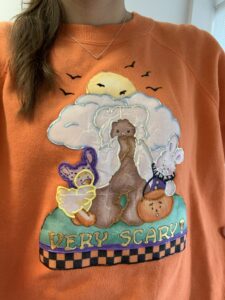Spooky Speech
Speech Language Pathologists love a good theme! Themes can unite all of our kiddos but allow scaffolding for every child’s needs. They also allow for perfect home carryover for all our families! Here are a few spooky speech activities that you can do with your children at home or in your community to promote speech and language development.
Books:
Books are fabulous! You can target specific vocabulary, different grammar (i.e. prepositions), comprehension, sequencing, feelings, and speech sounds! An example of a spooky themed book is Pete the Cat: Trick or Pete, an interactive book with flaps. We love to practice our speech sounds with this particular book! For example, the t sound is on every page with CAT and PETE!
Sensory Bins:
You cannot go wrong with a sensory bin! They hold children’s attention and their bodies in one space. Sensory bins can also encourage some spooky speech with what we call “focused stimulation”, when you pick a few words to target over and over again during play! Spooky speech sensory bins can easily be made from items around your house or a few clicks from amazon! If you are in need of some inspiration Busy Toddler has fantastic options.
Youtube:
Technology does not have to be a curse if used correctly! There are so many books and programs that provide ample spooky speech opportunities! You can play Peppa Pig Pumpkin Party and pause the video, ask simple wh questions, name vocabulary items, make predictions, and try to recall details of the program!
Bingo Card:
A fan favorite at the clinic is using a free printable Halloween Bingo Card. We use these for matching, naming, identifying, and speech sounds! You can take the Bingo Card into your community (i.e. grocery store, on a walk, flashlight to find items around the house) for a scavenger hunt. Target and Michaels have Halloween dollar-sticker-books that we use to say the spooky words as we match them to the bingo card.
 Festive Wear and Decor:
Festive Wear and Decor:
As cheesy as it may seem, children LOVE pointing out spooky vocabulary on clothing items and decorations. If you are trying to be eco and/or budget friendly, we highly recommend looking at your local thrift store, facebook marketplace, or your parent’s house for the clothing and decorations! Some of the best items come second hand! Another more eco friendly, minimalist approach would be to get items that will be re-purposed or consumed! I.E. a pie pumpkin, a wreath that can be decorated for all season with items found in nature!
If you feel like your child’s speech and language development isn’t spook-tacular and you’d like to speak with someone about your pumpkin’s speech and language development, please call 708-478-1820 or visit our website to schedule a free screening
Written by Jessica Keenan, MA, CCC-SLP/L, inspired by Kristen Santoro, MA, CCC-SLP/L

